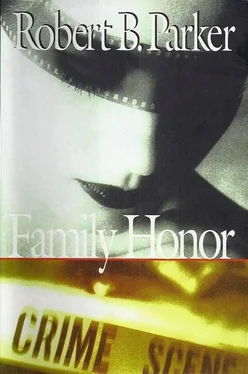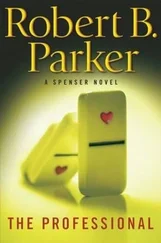“I told you, I don’t like it there.”
“Oh yeah,” I said.
Rosie had found the long rhomboid of sunshine that slanted in through the skylight, and was lying in it on her back, with her short legs sticking straight up and her tongue lolling out of the side of her mouth.
“I’m going to have to tell your parents I found you,” I said.
“You told me you wouldn’t.”
“No. I told you you didn’t have to go home.”
“You tell them and they’ll make me come home,” she said.
“I won’t tell them where you are, but they have the right to know you’re alive and well.”
“They’ll make you tell,” Millicent said.
“No,” I said.
“You work for them.”
“I work for myself.”
“But they’re paying you.”
“That’s their problem.”
“You won’t tell them where I am?”
“No.”
“Ever?”
“I don’t know about ever,” I said. “But I won’t tell them until you and I have decided it’s in your best interest.”
“Even if they won’t pay you anymore?”
“Even then.”
The doorbell rang. Rosie was instantly on her feet in full yap. As I walked to the door I took my gun off the bureau and held it at my side. I looked through the peephole. It was Richie. When he came in Millicent was as far at the other end of the loft as she could get.
If Richie saw the gun, which he did because he saw everything, he didn’t comment.
“Hello,” I said.
“Hello.”
There was never anything casual when we saw each other. No greeting was routine. There was a kind of charge between us that had been there since we were in elementary school and became pals, without any knowledge that my father was trying to put his father in jail. And his uncle. I had never not been glad to see him, even in the depths of it, when we couldn’t stand each other and he was so possessive I thought I’d fragment. Even then I was always aware that seeing him was special, and I was always aware that it was the same for him.
Rosie was ecstatic. She jumped and wiggled and chased her tail until Richie picked her up and held her in his right arm while he rubbed her belly with his left. She managed to lap his face awkwardly while this was going on.
“Millicent,” I said. “This is my ex-husband, Richie Burke. Richie, this is my friend Millicent Patton.”
She stayed at the far end. Richie put Rosie down and walked the length of the loft and put his hand out.
“Hello, Millicent.”
She took his hand, limply. I’d have to speak to her about that. I hate a limp handshake.
“How do you do,” Millicent said with no hint of enthusiasm.
Richie walked back to the kitchen and sat at my counter.
“You called?” he said.
I put the gun back on top of the bureau.
“I did,” I said. “I have to run out and talk with Millicent’s parents and I wondered if you could stay with her?”
“Sure.”
“Julie’s working, and Spike’s working and I know you work, but you’re not on a time clock and... I’m babbling.”
“Sure,” Richie said.
“I’m not telling anyone she’s here,” I said.
“And you don’t want anyone to come take her away,” Richie said.
He spoke softly so that Millicent wouldn’t overhear him. She was as far away as she could get and still be in the loft, staring out my east window at the Fort Point cityscape.
“That’s right.”
“Which you fear is a possibility.”
“You noticed the gun,” I said.
“Yeah. I’m very alert.”
I told him about the Irish guys.
“That’s it,” Richie said. “All you know is two Irish guys?”
“That’s all Tony said.”
“Tony thinks all non-Africans are Irish,” Richie said. “Doesn’t mean it’s anyone we know.”
When Richie said we, it always meant his family.
“I know.”
“I’ll ask around, however,” he said.
I nodded.
“Millicent,” I said loudly enough for her to hear. “I’m going to talk with your parents.”
“He going to stay here?” Millicent said.
“Yes. I’ll be an hour or two.”
“And you don’t think I can take care of myself?”
“He’s here for Rosie,” I said. “Anything I should tell your parents?”
“No.”
I took my gun off the bureau and put it on. Richie walked to the door with me.
“You have a gun?” I said.
He smiled at me.
“Of course you do,” I said and went out.
Behind me I heard the dead bolt slide into place on the inside.
The fire in the fireplace looked exactly the same. It would always look exactly the same. It was a gas fire. I was looking good. Double-breasted blue pinstripe suit, white shirt open at the throat. Black ankle boots. Tiny silver hoop earrings. Brock Patton was behind his desk, in his big high-backed, red leather swivel chair, where he seemed to feel most comfortable. Betty Patton sat in a caramel-colored leather wing chair to his left.
“You’ve found her then?” Patton said.
“Yes. She’s well and safe.”
“Where is she?”
“I can’t tell you that.”
“You what?” Betty Patton’s voice was like chilled steel.
“I can’t tell you where she is,” I said.
“Why not,” Betty said.
“She doesn’t want you to know.”
“Ms. Randall, are we not employing you?”
“So far,” I said.
“Don’t be ridiculous,” Betty said. “Where is she?”
I shook my head.
“You cannot sit here and tell me you are going to substitute the judgment of a fifteen-year-old runaway for that of her parents,” Betty said.
“Actually, I’m substituting my judgment,” I said.
“You have no right.”
“You hired me,” I said. “You didn’t purchase me.”
“And we can fire you,” Betty said. Her voice remained quiet and very cold.
“Something happened,” I said. “That made her run away.”
“What?”
“I don’t know.”
“Then how do you know something happened.”
It was as if Brock had disappeared. It was me and Betty Patton.
“Woman’s intuition.”
“I have resources,” Betty said. “Give me back my daughter or face serious consequences.”
“You wouldn’t have a thought, either of you, as to what might have been the, ah, precipitating event in your daughter’s departure?”
“There was no event. Millicent is spoiled and childish. But she is quite capable of manipulating any adult gullible enough to believe her.”
“Do you have anyone but me looking for her?”
“Perhaps we should.”
“But you don’t?”
“Of course not.”
“She’s afraid of something,” I said.
“What?”
“I don’t know.”
Betty’s ugly little laugh was derisive. “She’s a neurotic child,” Betty said.
“Has she been getting therapy?” I said.
“Doesn’t every teenaged brat that can’t cut it get therapy?” Brock said.
When he spoke it felt like an intrusion, something foreign to the angry exclusivity that connected me to Betty.
“Shut up, Brock,” Betty said.
“Isn’t that sweet,” Brock said. “‘Shut up,’ she explained.”
“Who’s her therapist?” I said.
“That is no concern of yours,” Betty said.
I nodded.
“Did you or your husband have a fight with Millicent before she left?”
“Ms. Randall,” Betty said. “I am not some Irish scrub woman, I do not fight with my daughter.”
“She’s very angry with you,” I said.
“Millicent doesn’t know what she’s angry about,” Betty said. “She is a petulant adolescent. Had you ever raised one you might be less inclined to take her at face value.”
Читать дальше












